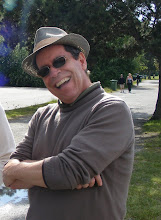Merton begins his day with a brief reflection on the contemplative life..."The contemplative life must provide an area, a space of liberty, of silence, in which possibilities are allowed to surface and new choices, beyond routine choices, become manifest. It should create a new experience of time, not as stopgap stillness, but as "temps vierge" [virgin time], not a blank to be filled or an untouched space to be conquered and violated, but a space which can enjoy its own potentialities and hopes, and its own presence to itself. But not dominated by one's own ego and its demands. Hence open to others - compassionate time..." AJTM p.117

Thomas Merton is a foundational figure in the recovery of the contemplative life in the western Christian tradition over the past 40 years. Indeed, it would be difficult to find many books on contemporary Christian spirituality which do not make reference to Thomas Merton in some way. His prolific writing has helped to open up the spiritual journey to a world hungering for depth and meaning.
Fourth and Walnut
The fruits of Merton's contemplative life include both a refreshing insight in to the human condition and a profound sense of love and compassion based on an awareness of the unity of all things. On March 18, 1958, in one of his most significant experiences of awakening Merton comes to a profoundly deep and joyful realization of the unity of humanity.
"In Louisville, at the corner of Fourth and Walnut, in the center of the shopping district, I was suddenly overwhelmed with the realization that I loved all those people, that they were mine and I was theirs, that we could not be alien to one another even though we were total strangers. It was like waking from a dream of separateness, of spurious self-isolation in a special world... This sense of liberation from an illusory difference was such a relief and such a joy to me that I almost laughed out loud." CGB pp.156-157
If Only, If Only!
"Then it was if I suddenly saw the secret beauty of their hearts, the depths of their hearts where neither sin nor desire nor self-knowledge can reach, the core of their reality, the person that each one is in God's eyes. If only they could all see themselves as they really are. If only we could see each other that way all of the time. There would be no more war, no more hatred, no more cruelty, no more greed..." CGB pp.158
Good Days in Dharamsala
Merton reflects on the "good days" he has spent amongst the Tibetan Buddhists of Dharamsala... "I have to pack early. My last interview with the Dalai Lama will be in the morning, with the jeep coming for me at 8:15. Then right after dinner we leave by jeep for Pathankot to take the evening train for Delhi. The sky is reddening behind the big spur of mountains to the east. The days here have been good ones. Plenty of time for reading and meditation, and some extraordinary encounters. So far my talks with Buddhists have been open and frank and there has been full communication on a really deep level. We seem to recognize in one another a certain depth of spiritual experience, and it is unquestionable." AJTM pp.123-124
A Last Thought
In a last thought for the day Merton reflects on the election back home... "Nixon of course has won the presidential election. But Humphrey was closer than I expected. Wallace was nowhere, and I am glad to here he did not take Kentucky (Nixon did). Our new president is depressing. What can one expect of him?" AJTM p.124
Peace and blessings... Rob
"The whole idea of compassion is based on a keen awareness of the interdependence of all these living beings, which are all part of one another, and all involved in one another." Thomas Merton




No comments:
Post a Comment